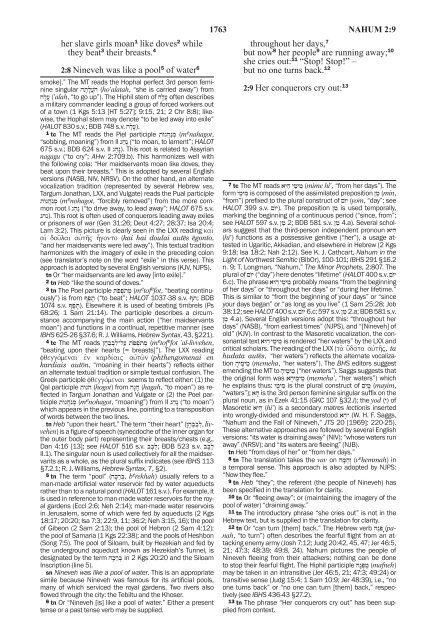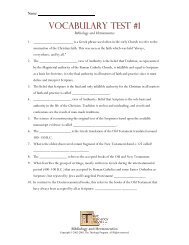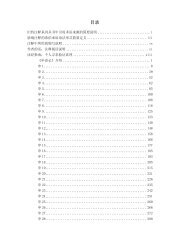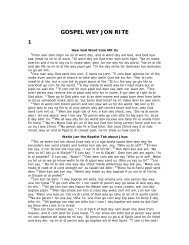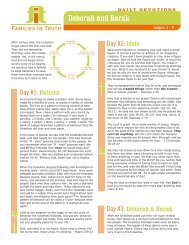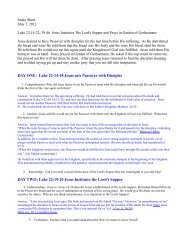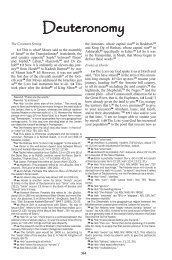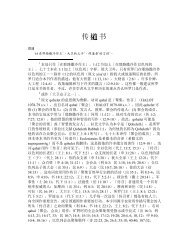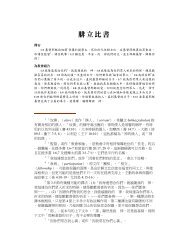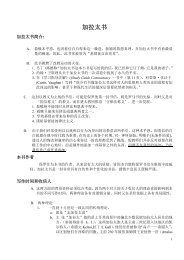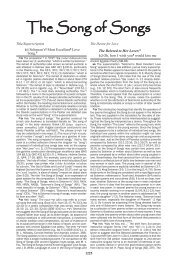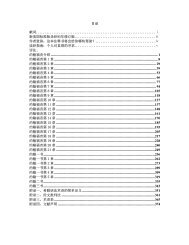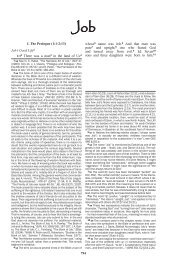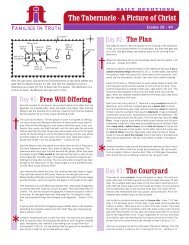Create successful ePaper yourself
Turn your PDF publications into a flip-book with our unique Google optimized e-Paper software.
her slave girls moan like doves whilethey beat their breasts. 2:8 Nineveh was like a pool of water smoke].” The MT reads the Hophal perfect 3rd person femininesingular הֹעֲלָ תָ ה (ho’alatah, “she is carried away”) fromoften describes עָ לָ ה (’alah, “to go up”). The Hiphil stem of עָ לָ הa military commander leading a group of forced workers outof a town (1 Kgs 5:13 [HT 5:27]; 9:15, 21; 2 Chr 8:8); likewise,the Hophal stem may denote “to be led away into exile”.(עָ לָ ה s.v. (HALOT 830 s.v.; BDB 748 tc The MT reads the Piel participle מְ נַהֲגוֹת (mÿnahagot,“sobbing, moaning”) from II נָהַ ג (“to moan, to lament”; HALOT675 s.v.; BDB 624 s.v. II ג .(נָהַ This root is related to Assyriannagagu (“to cry”; AHw 2:709.b). This harmonizes well withthe following cola: “Her maidservants moan like doves, theybeat upon their breasts.” This is adopted by several Englishversions (NASB, NIV, NRSV). On the other hand, an alternatevocalization tradition (represented by several Hebrew mss,Targum Jonathan, LXX, and Vulgate) reads the Pual participlecom- (mÿnohagot, “forcibly removed”) from the more מְ נֹהֲגוֹתmon root I נַהַ ג (“to drive away, to lead away”; HALOT 675 s.v.This root is often used of conquerors leading away exiles .(נהגor prisoners of war (Gen 31:26; Deut 4:27; 28:37; Isa 20:4;Lam 3:2). This picture is clearly seen in the LXX reading καὶαἱ δοῦλαι αὐτῆς ἤγοντο (kai Jai doulai auths hjgonto,“and her maidservants were led away”). This textual traditionharmonizes with the imagery of exile in the preceding colon(see translator’s note on the word “exile” in this verse). Thisapproach is adopted by several English versions (KJV, NJPS).tn Or “her maidservants are led away [into exile].” tn Heb “like the sound of doves.” tn The Poel participle מְ תֹפְ פֹת (mÿtofÿfot, “beating continuously”)is from תָ פַ ף (“to beat”; HALOT 1037-38 s.v. ֹף ;תּ BDB1074 s.v. פַ ף .(תָּ Elsewhere it is used of beating timbrels (Ps68:26; 1 Sam 21:14). The participle describes a circumstanceaccompanying the main action (“her maidservantsmoan”) and functions in a continual, repetitive manner (seeIBHS 625-26 §37.6; R. J. Williams, Hebrew Syntax, 43, §221). tc The MT reads מְ תֹפְ פֹת עַ ל־לִ בְ בֵ הֶ ן (mÿtofÿfot ’al-livvehen,“beating upon their hearts [= breasts]”). The LXX readingφθεγγόμεναι ἐν καρδίαις αὐτῶν (fqengomenai enkardiais autwn, “moaning in their hearts”) reflects eitheran alternate textual tradition or simple textual confusion. TheGreek participle φθεγγόμεναι seems to reflect either: (1) theQal participle הֹגוֹת (hogot) from הָ גָה (hagah, “to moan”) as reflectedin Targum Jonathan and Vulgate or (2) the Poel participleמְ נֹהֲגוֹת (mÿnohagot, “moaning”) from II נָהַ ג (“to moan”)which appears in the previous line, pointing to a transpositionof words between the two lines.tn Heb “upon their heart.” The term “their heart” בְ בֵ הֶ ן) ,לִ livvehen)is a figure of speech (synecdoche of the inner organ forthe outer body part) representing their breasts/chests (e.g.,לֵ בָ ב s.v. BDB 523 ;לֵ בָ ב s.v. Dan 4:16 [13]; see HALOT 516II.1). The singular noun is used collectively for all the maidservantsas a whole, as the plural suffix indicates (see IBHS 113§7.2.1; R. J. Williams, Hebrew Syntax, 7, §2). tn The term “pool” רֵ כָ ה) ,בְּ bÿrekhah) usually refers to aman-made artificial water reservoir fed by water aqueductsrather than to a natural pond (HALOT 161 s.v.). For example, itis used in reference to man-made water reservoirs for the royalgardens (Eccl 2:6; Neh 2:14); man-made water reservoirsin Jerusalem, some of which were fed by aqueducts (2 Kgs18:17; 20:20; Isa 7:3; 22:9, 11; 36:2; Neh 3:15, 16); the poolof Gibeon (2 Sam 2:13); the pool of Hebron (2 Sam 4:12);the pool of Samaria (1 Kgs 22:38); and the pools of Heshbon(Song 7:5). The pool of Siloam, built by Hezekiah and fed bythe underground aqueduct known as Hezekiah’s Tunnel, isdesignated by the term בְּ רֵ כָ ה in 2 Kgs 20:20 and the SiloamInscription (line 5).sn Nineveh was like a pool of water. This is an appropriatesimile because Nineveh was famous for its artificial pools,many of which serviced the royal gardens. Two rivers alsoflowed through the city: the Tebiltu and the Khoser. tn Or “Nineveh [is] like a pool of water.” Either a presenttense or a past tense verb may be supplied.1763 nahum 2:9throughout her days, but now her people are running away; 10she cries out: 11 “Stop! Stop!” –but no one turns back. 122:9 Her conquerors cry out: 13 tc The MT reads מִ ימֵ י הִ יא (mime hi’, “from her days”). Theform מִ ימֵ י is composed of the assimilated preposition מִ ן (min,“from”) prefixed to the plural construct of יוֹם (yom, “day”; seeHALOT 399 s.v. .(יוֹם The preposition מִ ן is used temporally,marking the beginning of a continuous period (“since, from”;see HALOT 597 s.v. מִ ן 2; BDB 581 s.v. מִ ן 4.a). Several schol-הִ יא ars suggest that the third-person independent pronoun(hi’) functions as a possessive genitive (“her”), a usage attestedin Ugaritic, Akkadian, and elsewhere in Hebrew (2 Kgs9:18; Isa 18:2; Nah 2:12). See K. J. Cathcart, <strong>Nahum</strong> in theLight of Northwest Semitic (BibOr), 100-101; IBHS 291 §16.2n. 9; T. Longman, “<strong>Nahum</strong>,” The Minor Prophets, 2:807. Theיוֹם s.v. (“day”) here denotes “lifetime” (HALOT 400 יוֹם plural of6.c). The phrase מִ ימֵ י הִ יא probably means “from the beginningof her days” or “throughout her days” or “during her lifetime.”This is similar to “from the beginning of your days” or “sinceyour days began” or “as long as you live” (1 Sam 25:28; Job38:12; see HALOT 400 s.v. יוֹם 6.c; 597 s.v. מִ ן 2.a; BDB 581 s.v.4.a). Several English versions adopt this: “throughout her מִ ןdays” (NASB), “from earliest times” (NJPS), and “[Nineveh] ofold” (KJV). In contrast to the Masoretic vocalization, the consonantaltext מִ ימֵ י הִ יא is rendered “her waters” by the LXX andcritical scholars. The reading of the LXX (τὰ ὕδατα αὐτῆς, taJudata auths, “her waters”) reflects the alternate vocalizationמֵ ימֶ יהָ (memeha, “her waters”). The BHS editors suggestemending the MT to מֵ ימֶ יהָ (“her waters”). Saggs suggests thatthe original form was מֵ ימֶ יהָ א (memeha’, “her waters”) whichhe explains thus: מִ ימֶ י is the plural construct of מָ יִם (mayim,“waters”); הָ א is the 3rd person feminine singular suffix on theplural noun, as in Ezek 41:15 (GKC 107 §32.l); the yod (י) ofMasoretic הִ יא (hi’) is a secondary matres lectionis insertedinto wrongly-divided and misunderstood ־הָ א (W. H. F. Saggs,“<strong>Nahum</strong> and the Fall of Nineveh,” JTS 20 [1969]: 220-25).These alternative approaches are followed by several Englishversions: “its water is draining away” (NIV); “whose waters runaway” (NRSV); and “its waters are fleeing” (NJB).tn Heb “from days of her” or “from her days.” tn The translation takes the vav on וְהֵ מָּ ה (vÿhemmah) ina temporal sense. This approach is also adopted by NJPS:“Now they flee.” tn Heb “they”; the referent (the people of Nineveh) hasbeen specified in the translation for clarity.10 tn Or “fleeing away”; or (maintaining the imagery of thepool of water) “draining away.”11 tn The introductory phrase “she cries out” is not in theHebrew text, but is supplied in the translation for clarity.12 tn Or “can turn [them] back.” The Hebrew verb ָפּ נַה (panah,“to turn”) often describes the fearful flight from an attackingenemy army (Josh 7:12; Judg 20:42, 45, 47; Jer 46:5,21; 47:3; 48:39; 49:8, 24). <strong>Nahum</strong> pictures the people ofNineveh fleeing from their attackers; nothing can be doneto stop their fearful flight. The Hiphil participle מַ פְ נֶה (mafneh)may be taken in an intransitive (Jer 46:5, 21; 47:3; 49:24) ortransitive sense (Judg 15:4; 1 Sam 10:9; Jer 48:39), i.e., “noone turns back” or “no one can turn [them] back,” respectively(see IBHS 436-43 §27.2).13 tn The phrase “Her conquerors cry out” has been suppliedfrom context.


